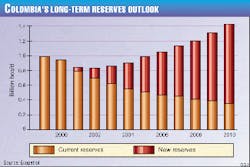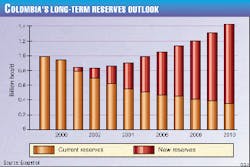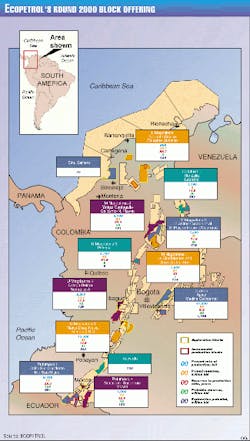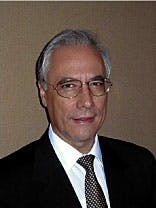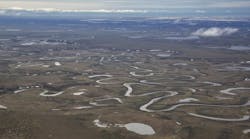Colombia is trying to turn around its flagging petroleum exploration efforts with offerings of new acreage and new incentives.
With aims to resuscitate their country's ailing oil and natural gas exploration and production sector, a delegation from Colombia recently traveled to the US and Canada in an attempt to drum up foreign investment interest in their country (OGJ, Oct. 25, 1999, Newsletter).
And with the potential of becoming an oil importer looming over the country's not-too-distant future if no new major discoveries are made, state oil firm Empresa Colombiana de Petróleos SA (ECOPETROL) has taken it upon itself to sweeten the incentives for foreign capital investment.
Among those participating in the "road show" was then-ECOPETROL Pres. Carlos Rodado, who pitched his company's latest block offering and outlined the country's newly revamped hydrocarbon policy at a road show stop in Houston this month. (Since the road show's completion, Rodado stepped down from the leadership of the state-owned firm to take up a post as Colombia's envoy to the World Trade Organization. In turn, Colombian Pres. Andrés Pastrana has named Alberto Calderon to succeed him. Calderon, a deputy finance minister and Colombia's chief debt negotiator, took the helm of ECOPETROL Nov. 12.)
Colombia's status
Colombia's oil sector is, and should continue to be, of great importance for its economy, says Maria Mercedes Prado, Colombia's vice-minister of mines and energy for hydrocarbons.
"Colombia has a significant hydrocarbon reserves potential. Such potential has been estimated at 37 billion boe," Prado said. Nevertheless, the country remains practically unexplored: "Except [for] exploration activity...in what we call the active basins, there has been no exploration at all. The active areas are limited to 5 of Colombia's 18 sedimentary basins," said Prado.
Among Colombia's most significant trump cards, states Prado, is its long history of stable contractual terms. "...proof of [this]," she said, "is that upstream business has been open to private investment since early in the 20th century. Even at times when most Latin American countries took the position of nationalizing [their] oil industr[ies], Colombia kept the upstream activities open to private investors."
Even with these factors as strengths, Colombia faces a serious problem with its reserves-to-production ratio, warns Prado. "Even at high production levels, the sector has become essential to the country's economy.
"The oil sector represents more than 4.5% of our GDP, more than 20% of Colombia's exports, and generates through royalties significant investment resources to our local government," Prado said.
And despite Colombia's increase in production levels, the discovery of new reserves has been decreasing over the past few years, a trend the country would like to see reversed (Fig. 1).
In fact, Prado points out that "Colombia...bears the risk of becoming an oil importer by the year 2004."
During his presentation, Rodado noted that Colombia is the third largest crude oil exporter and the fourth largest oil producer in Latin America. "We would also like to stress the strength and stability of our economy, which offers not just an investment in exploration and production, but in the energy business of the country as a whole," he said.
"Like any other country," Rodado continued, "Colombia's economy has been subject to cycles. However, over the years, our economy has demonstrated remarkable resilience and stability.
"The percentage of our population with unsatisfied basic needs has dropped from over 45% in 1985 to above 25% last year. In addition, inflation has declined from over 30% at the beginning of this decade to about 10% this year," said Rodado. "Further evidence of Colombia's economic stability is our triple B minus credit rating, which is the second-best credit rating in Latin America behind only Chile and, perhaps surprisingly, is the same as that of [South] Korea."
ECOPETROL's status
ECOPETROL will have estimated gross revenues for 1999 of about $4 billion and estimated net income of about $700 million, Rodado says. "While Colombia as a whole produces 850,000 b/d of oil, ECOPETROL itself has current net oil production of over 450,000 b/d," said Rodado. "Of this volume, we operate over 100,000 b/d. We have refining capacity of over 275,000 b/d and operate nearly 5,000 km of oil pipelines and 5,000 km of gas pipelines," he said.
"While production increases have been impressive," said Rodado, "not enough has been done to replace Colombia's reserves, which, in contrast, have decreased nearly 25% over the past 6 years with insufficient exploration activity to allow for adequate reserve replacement.
"Although today Colombia is at an historical production peak, we have shown these levels are not sustainable without an increased exploration effort and aggressive reserve replacement. If nothing much more is done, a significant production rate decline, starting in 2001, will occur," Rodado said.
"With oil exports representing about 20% of Colombia's exports, such a decline in production would have a serious implication for the country. ECOPETROL estimates that...to achieve the country's goals through 2010 will require something in the order of $6 billion in exploration expenditure and over $9 billion or so in development expenditure," said Rodado.
The greater part of Colombia's oil potential comprises 18 sedimentary basins, 6 of which already have substantial production and 12 are what ECOPETROL would consider underexplored.
"Tremendous potential in these areas has been highlighted by world-class discoveries at Caño Limón, Cusiana, and Cupiagua," said Rodado. "We believe that Colombia's sedimentary basins are highly prospective and may offer a potential of as much as 37 billion boe, some 70% of which we think will be liquids. To put this number in perspective, this is about four times the total amount of hydrocarbons discovered to date [in Colombia]."
Colombia's new policy
President Pastrana has embarked on the development and implementation of a new hydrocarbon policy designed to attract private investment to Colombia's upstream sector, Rodado says.
Viewed by those involved to represent one of the most comprehensive governmental reforms in Colombia's hydrocarbon sector in the past 30 years, the new policy primarily acknowledges the growing importance of the hydrocarbon sector in Colombia's economy.
Also, the reform plan will "create a condition to attract the foreign investment necessary to achieve our goal," Rodado said.
Several chief alterations to Colombia's economic framework have been made, says Rodado, which will result in a significant improvement to the rate of return on virtually all oil and gas projects. This is due, mostly, to the change in the formula to calculate the R-factor, or the ratio between the investor's cumulative revenues and cumulative expenditures, which includes investment in exploration and development, operating, and transfer costs.
Under the new policy, when cumulative production in a field is below 60 million bbl, the investor's share will be 70%, reflecting the working interest after ECOPETROL's back-in. Once cumulative production reaches 60 million bbl, says Rodado, the investor's share will be 70% as long as the R-factor remains below 1.5-the point where the investor has recovered 150% of his costs. Presently, this is split 50-50.
In addition, the procedure for processing and obtaining environmental licenses has been simplified, substantially reducing the period for approval, Rodado says. Seismic exploration activities, in fact, require environmental permits only in exceptional cases (see related story, p. 18). And a blanket environmental license can now be issued for the entire exploration phase, whereas, previously, a permit was required for each activity. These changes have resulted in the issuance of a license in less than 4 months' time, half the time in the past.
In addition, Colombia's association contract policies have also undergone changes. Now, once a commercial discovery is made, ECOPETROL has the right to back in at 30%, vs. the previous 50%, in contracts with private firms.
Also, Colombia has instituted a sliding scale for royalties. The flat 20% royalty has been replaced with a variable royalty system, better suited to the fields' production cycle and investors' objectives, says Rodado.
The new royalty system-which is applicable to new discoveries under both new and existing contracts-now starts at 5% for fields producing up to 5,000 boe/d and increases to 20% for fields producing 125,000 boe/d.
"For the 125,000-400,000 boe/d production range," said Rodado, "the royalty rate remains 20%. [It is] only for fields that produce in excess of 400,000 boe/d that the royalty rate exceeds the 20% established in the old regime. The rate reaches a ceiling of 25% for giant fields producing over 600,000 boe/d."
These changes are occurring in unison with other policy changes being made in many of Colombia's other industrial sectors: Rodado said, "The new attitude toward private investment under President Pastrana's administration has already had a profound effect on the way business is done in Colombia...during the last several years, Colombia has undertaken a series of privatization including utilities, natural gas distribution, banks, and telecommunications.
"We realize that Colombia is competing for investment dollars with other countries both in Latin America and elsewhere. We believe that these new terms now position Colombia favorably in the competition for these dollars."
Certain issues remain unanswered however, as illustrated by concern by investors over the level of safety for those operating in a country that has experienced more than its share of domestic strife. Rodado responds, "Let me say, at this point, that we are all aware of the concerns that are felt by companies on these matters. ECO- PETROL plans to take all reasonable steps to assist and create a role for itself in trying to limit the impact that this has on companies participating in Colombia's oil sector. This is something on which we will be working actively over the coming months."
Ecopetrol's strategy
ECOPETROL's most recent answer to the call of Colombia's declining reserves problem and stunted discovery program has been to issue a revised version of an exploration-production offering made earlier this year, dubbed Round 2000 (OGJ, August 9, 1999, Newsletter). The round is a package of 13 units of blocks previously reserved for ECOPETROL.
The offering comprises: 10 units with both production and one or more exploration blocks; two units with exploration-only blocks; and one with only incremental production (Fig. 2).
As outlined by Rodado, the offering breaks down into four categories:
- Open acreage areas made up of blocks exploratory in nature, which are neither licensed to private investors nor reserved for ECOPETROL.
- Areas currently operated by private investors, including blocks that are in either exploration or production phases, which account for nearly 90% of the country's production.
- ECOPETROL-operated areas, including blocks that have been reserved for ECOPETROL's own exploration efforts, blocks that have been relinquished to ECOPETROL at the completion of an associated contract, and production blocks that ECOPETROL operates following its own successful exploration efforts.
- Areas known to be prolific with natural gas.
ECOPETROL's stipulation behind the offering is plain: "Our goal is to reverse the trend of declining production and achieve production of 1.3 million boe/d by the year 2010. A substantial proportion of this is expected to come from new activity in currently open acreage. For this reason, and in addition to the new terms discussed just now, the board of ECOPETROL recently approved the new association concept for open acreage," said Rodado.
The units being offered are in Colombia's six producing basins: the lower, middle, and upper Magdalena River valleys; Catatumbo; Llanos; and Putumayo. All but two of the offered units have existing production.
Apiay-Medina Occidental-just east and south of Bogota-carries the largest reserves of the units on offer. The Apiay field produces about 40,000 b/d and offers an additional 30 million bbl of reserves to be tapped.
The offsetting exploration block Medina Occidental, which lies on trend with the supergiant tandem fields of Cusiana and Cupiagua, offers world-class potential. ECOPETROL estimates suggest that up to 2 billion bbl could be found there.
Acevedo is one of two purely exploratory units; ECOPETROL believes that it has the potential for discoveries for several hundred million bbl.
Rodado said, "The two units in the Lower Magdalena-Guamito and Sinú Santero-offer interest in natural gas potential. Qualified parties will have access to the data from mid-December 1999 through March 2000."
ECOPETROL expects to complete the offering process, begin receiving formal bids in April 2000, and announce winning bids in late April 2000.
Former ECOPETROL Pres.
Carlos Rodado
"Although today Colombia is at an historical production peak, we have shown these levels are not sustainable without an increased exploration effort and aggressive reserves replacement. If nothing much more is done, a significant production rate decline, starting in 2001, will occur... To achieve the country's goals through 2010 will require something in the order of $6 billion in exploration expenditure and over $9 billion or so in development expenditure."
